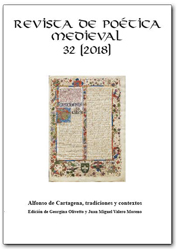On the subject of Alfonso de Cartagena’s Aristotelianism. In the legal and ecclesiological debate
DOI:
https://doi.org/10.37536/RPM.2018.32.0.64336Keywords:
Alfonso de Cartagena, Renaissance Aristotelism, Castilian Humanism, Council of BasileaAbstract
Aristotelianism is the most characteristic facet of the Alfonso de Cartagena’s thought. His two first original works address Aristotle’s Ethic: Memoriale virtutum (1425) and Declamationes (1430). He reveals himself as a scholastic and strong thomistic aristotelian. Cartagena judged that his mission as ambassador in Basel would be a good occasion to make his Declamationes public among humanists,specially his defense of the antiqua translatio from the scholastic point of view facing the Bruni’s attacks. During this mission he composed two works in which the use of Aristotle was decisive: the Tractatus super repetitione Ludovici de Roma (c.1436-1437) and an oratio against the most radical conciliar party (1439). The first one is unpublished. The second one is only known by the abstracts of two historians of the council of Basel, Pius II and Juan de Segovia. These works are a very interesting testimony of the uses of Aristotle in a crucial time of the ecclesiologic discussion about the nature of the papal power.
Downloads
Métricas alternativas
Downloads
Published
How to Cite
Issue
Section
License
The opinions and facts stated in each article are the exclusive responsability of the authors. The University of Alcalá is not responsible in any case for the credibility and aunthenticity of the studies.
Authors will retain the rights on their work, even if they will be granting the journal a non-exclusive right of use to reproduce, edit, distribute, publicly communicate and show their work. Therefore, authors are free to enter into additional, independent contracts for non-exclusive distribution of the works published in this journal (such as uploading them to an institutional repository or publishing them in a book), as long as the fact that the manuscripts were first published in this journal is acknowledged.
Works are published under the terms stipulated in the Attribution-NonCommercial-ShareAlike 4.0 International License (CC BY-NC-SA 4.0) that allows third parties to share the work under the following conditions:
Attribution — You must give appropriate credit, provide a link to the license, and indicate if changes were made. You may do so in any reasonable manner, but not in any way that suggests the licensor endorses you or your use.
NonCommercial — You may not use the material for commercial purposes.
ShareAlike — If you remix, transform, or build upon the material, you must distribute your contributions under the same license as the original.










